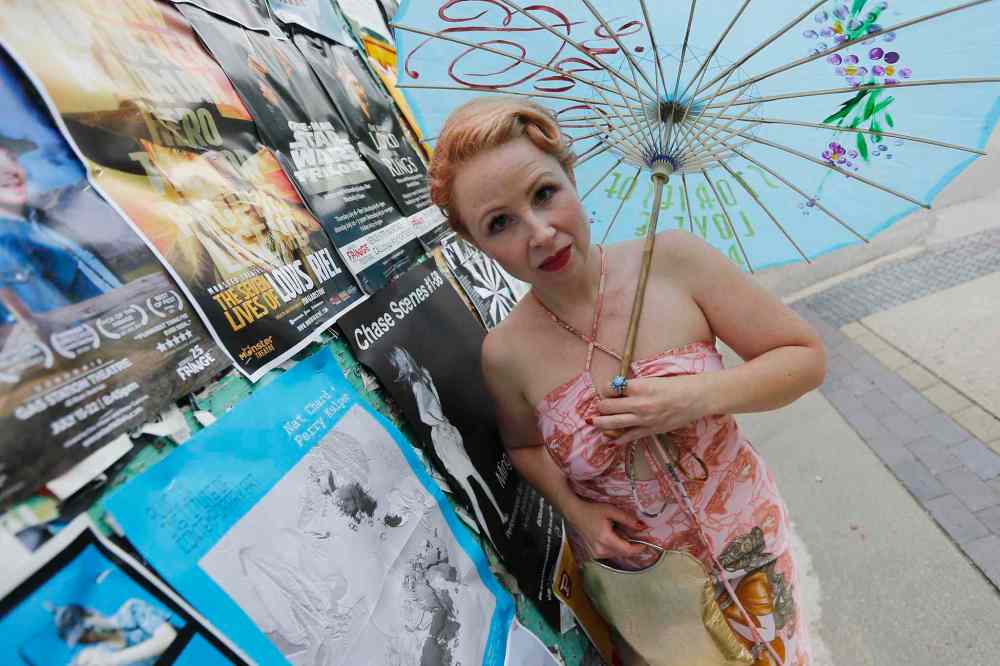Covering up the truth: burlesque dancer can’t even speak out in Saskatchewan
Advertisement
Read this article for free:
or
Already have an account? Log in here »
To continue reading, please subscribe:
Monthly Digital Subscription
$1 per week for 24 weeks*
- Enjoy unlimited reading on winnipegfreepress.com
- Read the E-Edition, our digital replica newspaper
- Access News Break, our award-winning app
- Play interactive puzzles
*Billed as $4.00 plus GST every four weeks. After 24 weeks, price increases to the regular rate of $19.00 plus GST every four weeks. Offer available to new and qualified returning subscribers only. Cancel any time.
Monthly Digital Subscription
$4.75/week*
- Enjoy unlimited reading on winnipegfreepress.com
- Read the E-Edition, our digital replica newspaper
- Access News Break, our award-winning app
- Play interactive puzzles
*Billed as $19 plus GST every four weeks. Cancel any time.
To continue reading, please subscribe:
Add Free Press access to your Brandon Sun subscription for only an additional
$1 for the first 4 weeks*
*Your next subscription payment will increase by $1.00 and you will be charged $16.99 plus GST for four weeks. After four weeks, your payment will increase to $23.99 plus GST every four weeks.
Read unlimited articles for free today:
or
Already have an account? Log in here »
Hey there, time traveller!
This article was published 14/07/2015 (3747 days ago), so information in it may no longer be current.
The Lyric Theatre in Swift Current, Sask., has an issue with Rosie Bitts’ bits.
Well, bit, more accurately. The Victoria, B.C.-based burlesque performer — who is bringing her show, Stories of Love and Passion, to the Winnipeg Fringe Theatre Festival this week — was kicked offstage Friday night after doing a minutes-long opening set that criticized the Saskatchewan government.
First, some background: in 2014, Saskatchewan lifted its longtime ban on striptease in licensed establishments. Total nudity would still be a no-no, but performers could wear pasties.

A little more than a year later, in April of this year, Saskatchewan made stripping in bars illegal again. Premier Brad Wall said the government made “a mistake” in 2014 and cited concerns about human trafficking. Many critics of the law — including dancers — say the decision has less to do with exploitation than it does to do with conservative moralizing.
There is one loophole in the legislation: striptease entertainment is legal in Saskatchewan if it’s for a once-a-year charity event in a “limited special-use facility.”
Not unlike the women of Instagram who are brilliantly Photoshopping men’s acceptable nipples over their own unacceptable nipples to highlight the hypocrisy of that social media network’s photo-sharing polices, Bitts’ piece — which was recorded — questioned the Saskatchewan government’s ban on the female nipple, as well as what the law says about men and their ability to control themselves.
It was a gentle ribbing, honestly, but a nervous woman from the Lyric Theatre quickly pulled the plug. The woman is hard to hear on the recording but, after thanking Rosie for her dance and asking if she had another, she said something like, “We have support from different areas, and I didn’t realize we’d be doing this tonight.” One of those supporters is Saskatchewan Lotteries, which the woman thanked after promptly moving on to the raffle.
It took Bitts a second to wrap her mind around what was happening: her piece on censorship was being censored.
“I was shocked. I was absolutely shocked,” Bitts tells me over coffee Tuesday morning. Bitts’s show had gone over well with the audiences during its run at Swift Current’s Chautauqua Theatre Festival, though one performance was protested by a street preacher who was eventually told to stop by police. When she was tapped to be an opener for a different show Friday night, she figured some topical, regional humour would be appropriate.
Evidently, she was mistaken.
Bitts wasn’t the only one who was shocked. The audience, too, couldn’t believe what was happening. “People afterwards said they thought I had actually set it up because it was such a great illustration of censorship,” Bitts says. “This law has just been changed; I was standing there in my pasties and G-string — which I was allowed to perform in but not allowed to strip down to. The rules are just that ridiculous, and I’m apparently not allowed to talk about it. I was just allowed to do another one of my lovely little dances.”
And that’s one of the most galling things about Friday night’s incident: Bitts was essentially told to shut up and dance. “That killed me,” she says. “Let us just sexualize you, but we don’t want to actually hear from you.”
As a burlesque performer, Bitts is all too used to having constraints placed on her body via rules that are as blurry as they are varied. “I understand that as women in Canada, we actually don’t have agency over our bodies 100 per cent,” she says. “But to have my words limited? I didn’t think that existed here.”
Bitts was simply doing what all good artists do: she was using her art to challenge the status quo; to ask why things are the way they are. What she was saying wasn’t even particularly incendiary and has been echoed elsewhere. For body parts society insists are “private,” female breasts — nipple inclusive — are sure are up for public debate a lot.
When women’s bodies, and what we can and cannot do with them, become a matter of government policy, we should absolutely be asking questions. For Bitts, this is bigger than striptease laws in Saskatchewan. This is about Canadian women having agency over their own bodies. All Canadian women.
As a Canadian woman and an artist, Bitts should be able to express her concerns and criticisms without fear of censorship or reprisal.
“The arts is where we are freely able to express what we, as a people, are thinking about,” she says. “When we shut down the art and censor what can be said there, we’re in a really scary place in Canada. It seems like a little thing, me getting kicked offstage, but it’s not.”
She’s right — it’s not. And it’s a scary place, indeed.

Jen Zoratti is a columnist and feature writer working in the Arts & Life department, as well as the author of the weekly newsletter NEXT. A National Newspaper Award finalist for arts and entertainment writing, Jen is a graduate of the Creative Communications program at RRC Polytech and was a music writer before joining the Free Press in 2013. Read more about Jen.
Every piece of reporting Jen produces is reviewed by an editing team before it is posted online or published in print – part of the Free Press‘s tradition, since 1872, of producing reliable independent journalism. Read more about Free Press’s history and mandate, and learn how our newsroom operates.
Our newsroom depends on a growing audience of readers to power our journalism. If you are not a paid reader, please consider becoming a subscriber.
Our newsroom depends on its audience of readers to power our journalism. Thank you for your support.
History
Updated on Wednesday, July 15, 2015 2:49 PM CDT: Corrects spelling of Chautauqua.
Updated on Wednesday, July 15, 2015 3:07 PM CDT: Clarifies details.


















.jpg?w=100)
